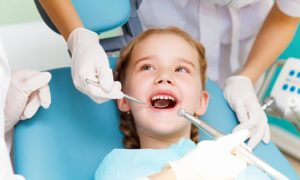Sleep-disordered breathing (SDB) is a common and growing problem affecting the health of children. Studies show close to 20% of all children snore and grind their teeth at night. Of the group that does snore, about 20 % of those children will have more severe forms of Obstructive Sleep Apnea (OSA).
Clinical symptoms of untreated sleep-disordered breathing (SBD) may include, excessive daytime sleepiness, bed-wetting, behavioral problems, failure to grow, and in some cases heart complications. If left untreated, these heart issues can become even more problematic in adulthood.
The dental signs of SBD are extreme wear of the teeth (due to grinding), cheek biting, narrow arches with severely crowded teeth, or teeth in crossbite. (A crossbite can be noticed when the child bites down and his or her jaw shifts to one side when closing or chewing.) Another common sign of SBD is abnormal tongue swallowing and positioning. Often these patients breathe chronically through their mouth and position their tongue in a forward position to allow for mouth breathing to occur.
There are an increasing number of children with behavioral problems that are diagnosed with Attention Deficit Hyperactivity Disorder (ADHD). Many studies have shown that a large number of these children diagnosed with ADHD were later shown to have a sleep disorder that caused them to exhibit behavior problems during the day, due to lack of adequate sleep at night.
What should you as a parent do?
See your pediatrician and tell them about your concerns. They will most likely evaluate the tonsils and adenoids and make a recommendation if they feel it is necessary, to have an evaluation by an ENT (Ear, Nose, and Throat) Specialist.
Your family dentist is also a good source for referral to an Orthodontic specialist who can help your child increase their nasal breathing, correct the severe crowding and narrow jaws, and eliminate the cross bites through the use of maxillary (upper jaw) palatal expansion.
As an Orthodontist, in practice for over 25 years, Dr. Carter has seen thousands of patients, some as young as 6 years of age, who had expansion appliances placed in both upper and lower jaws, and all snoring and teeth grinding disappeared along with crossbites and severe crowding.
Furthermore, numerous studies done mostly by the medical community have shown time and time again, the health benefits of maxillary palatal expansion. Some studies have also shown that problems such as bed wetting, excessive daytime sleepiness, and even behavioral problems all are resolved with a change in the jaw size, shape, and function and a substantial increase in nasal breathing through palatal expansion.
If your child has any of the following symptoms, they may be a candidate for tonsil and adenoid removal, as well as an evaluation by an Orthodontic specialist for maxillary palatal expansion.
- Continuous loud snoring
- Chronic mouth breathing
- Excessive daytime sleepiness
- Frequent headaches
- Grinding and excess wear of the teeth (especially the baby teeth)
- Behavior problems such as not paying attention, aggressiveness, and hyperactivity
- Enlarged tonsils and adenoids
- Problems sleeping, bed wetting, and sleepwalking
If you have concerns that your child may have SDB, a call to your pediatrician is the next step. We also offer a free consultation to have your child evaluated to determine if their persistent snoring, teeth grinding or daytime sleepiness, could be due to narrow jaws, severe crowding, a crossbite, or mouth breathing. You can call Margaret at 916-435-8000 (Rocklin) or 530-432-3483 (Penn Valley) to schedule a complimentary orthodontic evaluation.







